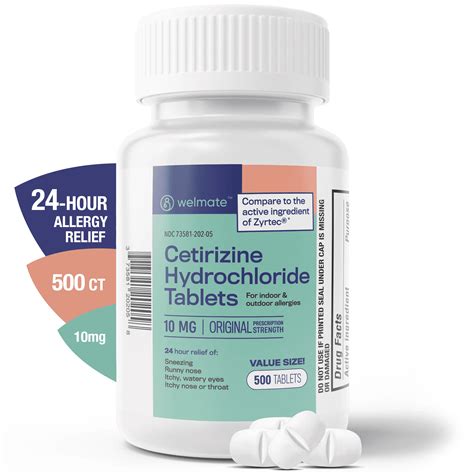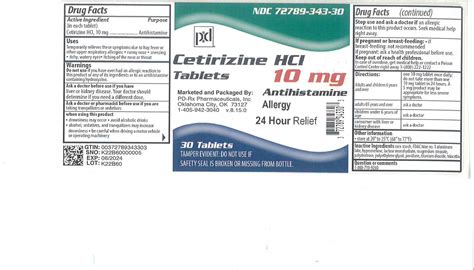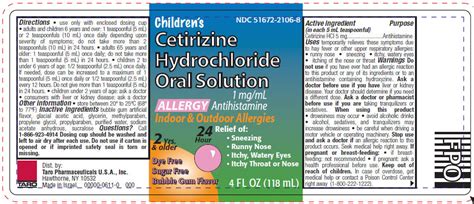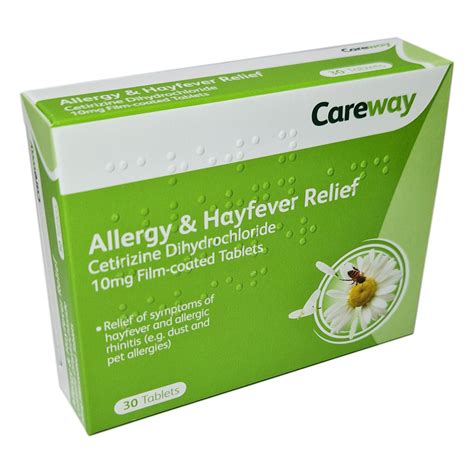Intro
Discover the benefits and risks of Cetirizine Hydrochloride 10mg, an antihistamine medication used to treat allergies, itching, and hives. Learn about its uses, dosage instructions, and potential side effects, including drowsiness, dry mouth, and stomach pain. Get informed about this common allergy relief medication and make an educated decision about its use.
Cetirizine hydrochloride, commonly known by its brand name Zyrtec, is a widely prescribed antihistamine medication used to alleviate symptoms associated with allergies, hay fever, and urticaria (hives). The 10mg dosage is one of the most commonly prescribed strengths of this medication. In this article, we will delve into the uses, dosage, and potential side effects of cetirizine hydrochloride 10mg.

What is Cetirizine Hydrochloride Used For?
Cetirizine hydrochloride is primarily used to treat symptoms of allergies, including:
- Allergic rhinitis (hay fever)
- Urticaria (hives)
- Itching associated with skin conditions
- Allergic conjunctivitis (eye allergies)
It works by blocking the action of histamine, a chemical released by the body's immune system during an allergic reaction. By blocking histamine, cetirizine hydrochloride reduces the symptoms of allergies, such as itching, sneezing, runny nose, and watery eyes.
How Does Cetirizine Hydrochloride Work?
Cetirizine hydrochloride is a non-sedating antihistamine, meaning it does not cross the blood-brain barrier and therefore does not cause drowsiness. It works by selectively binding to histamine receptors in the body, preventing histamine from triggering allergic reactions.
The medication is quickly absorbed into the bloodstream after oral administration and reaches peak levels within 1-2 hours. It has a long duration of action, lasting up to 24 hours, making it a convenient once-daily medication.

Cetirizine Hydrochloride 10mg Dosage
The recommended dosage of cetirizine hydrochloride 10mg is:
- Adults and children 6 years and older: 10mg once daily
- Children 2-5 years: 5mg once daily
- Children under 2 years: Not recommended
It is essential to follow the dosage instructions provided by your doctor or pharmacist. Taking more than the recommended dose can increase the risk of side effects.
Precautions and Contraindications
Before taking cetirizine hydrochloride 10mg, inform your doctor if you:
- Have kidney or liver disease
- Have a history of seizures or epilepsy
- Are pregnant or breastfeeding
- Have a history of allergic reactions to antihistamines
Cetirizine hydrochloride 10mg is contraindicated in patients with:
- Known hypersensitivity to cetirizine or any other component of the medication
- Severe kidney disease (creatinine clearance < 10 mL/min)

Possible Side Effects of Cetirizine Hydrochloride 10mg
While cetirizine hydrochloride 10mg is generally well-tolerated, some possible side effects include:
- Drowsiness
- Dry mouth
- Fatigue
- Headache
- Stomach upset
- Diarrhea
- Muscle pain
Serious side effects are rare but can include:
- Anaphylaxis (severe allergic reaction)
- Angioedema (swelling of the face, lips, tongue, or throat)
- Increased risk of seizures in patients with a history of seizure disorders
If you experience any side effects, consult your doctor or pharmacist for advice.

Interactions with Other Medications
Cetirizine hydrochloride 10mg can interact with other medications, including:
- Sedatives and tranquilizers
- Anticholinergic medications
- Muscle relaxants
- Antihistamines
- MAOIs (monoamine oxidase inhibitors)
Inform your doctor or pharmacist of all medications you are taking before starting cetirizine hydrochloride 10mg.
Storage and Disposal
Store cetirizine hydrochloride 10mg tablets at room temperature (68-77°F) in a dry place, away from direct sunlight and moisture. Dispose of unused or expired medication according to local regulations.

Conclusion
Cetirizine hydrochloride 10mg is a widely prescribed medication for the treatment of allergies, hay fever, and urticaria. While generally well-tolerated, it is essential to follow dosage instructions and be aware of potential side effects and interactions with other medications. If you have any concerns or questions, consult your doctor or pharmacist for advice.
What is the recommended dosage of cetirizine hydrochloride 10mg for children?
+The recommended dosage of cetirizine hydrochloride 10mg for children is 5mg once daily for children 2-5 years, and not recommended for children under 2 years.
Can I take cetirizine hydrochloride 10mg with other medications?
+Consult your doctor or pharmacist before taking cetirizine hydrochloride 10mg with other medications, as it can interact with sedatives, anticholinergic medications, and other antihistamines.
What are the common side effects of cetirizine hydrochloride 10mg?
+Common side effects of cetirizine hydrochloride 10mg include drowsiness, dry mouth, fatigue, headache, and stomach upset.
